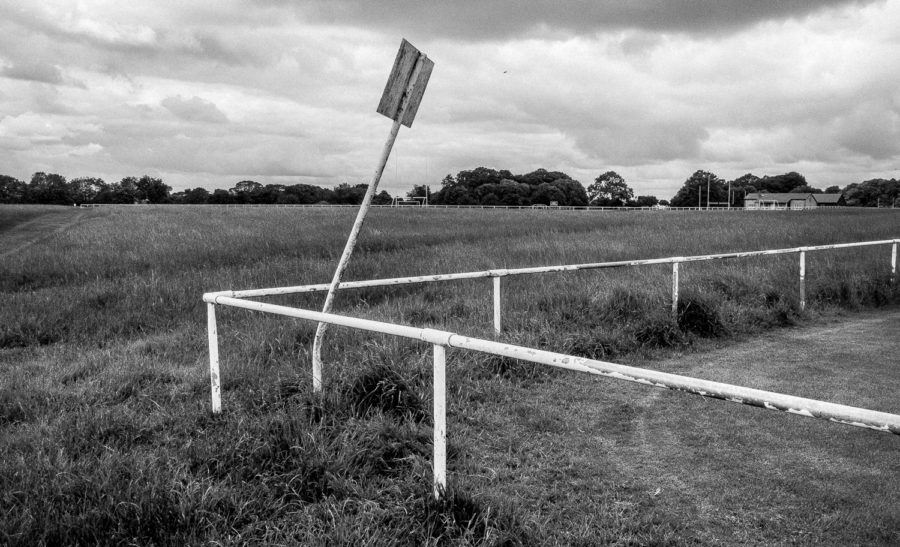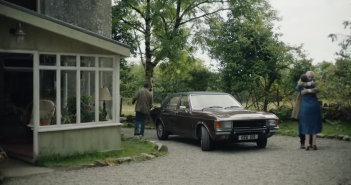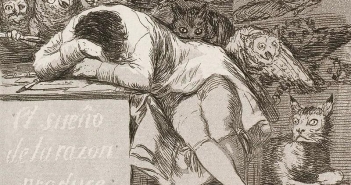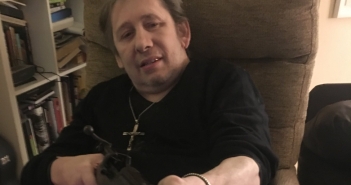In 1967, the fidgets struck again. That was the year my mother died, rapidly following my father.
I confess now that I was not obviously upset by the deaths of my parents. In the culture of my generation and class, love, certainly any public expression of it, was an embarrassment. Such namby-pamby language was confined to the worship of film stars, sentimental songs, Jesus Christ and drink. This lack I often regret, having, in the area of emotional expression a limited palette.
Affection, attachment, addiction, obsession, sentiment, desire, lust, liking, fondness – I am familiar with them all. But love itself is awkward territory, partly because the language of its expression is so inadequate, so debased that I have come to believe that, ‘whereof man cannot speak, let him be silent.’ Predictably, when I am confronted by the technicolour emotions of a funeral, however tragic, what usually comes to mind is a black and white war etching by Goya whose chilling caption is: ‘Shut up and bury your dead.’
But this is merely a defence, a carapace adopted because I have a dread of being caught weeping, which weakness I am occasionally prone to, especially on occasions musical. Only an embarrassed few have ever been allowed to witness this, my Achilles heel.
Besides, there is Gerard Manley Hopkins’ poem, ‘Goldengrove’, in which a young girl, Margaret, grieves over the fall of Autumn leaves. Hopkins gently points out to her that as she ‘grows older she will come to sights colder’ and realise that it is actually her own demise she mourns. This applies to all funerals.
I have no doubt that my parents – from their astral heights, of course – now understand the convolutions of my career. Including, for instance, why I declined to have my own children baptised in any faith, and why I have sung in both Catholic and Protestant choirs with no residue of belief in either of their dogmas – except as a useful social glue. I also admire the Semitic cultures of both Islam and Judaism and wish they would return to their pre-colonial mutual tolerance. My bets are therefore hedged. Music is my sole spiritual sustainer and default position on religion.
What else could one expect from a flibbertigibbet?
Decision Time
Finally in 1967 I had had enough of the commercial dimension of television corrupting the concept of public broadcasting. Brilliant people in advertising were conspiring with TV managers, using reason to control the irrationalism of the masses and turn them into numbered consumers. But vestiges of common sense told me I needed to learn more about how the real world worked.
A friendly philosopher, the late Jack Dowling, advised me to study Shakespeare. That was not drastic enough for me. I went to the RTÉ Programme Controller, said I had developed mental indigestion and was leaving television. That aesthetic man with a cigarette holder, the late Michael Garvey, said ‘stay brave’ and told me he would treat it as a sabbatical and pay my salary for three months. In retrospect it felt like compassionate leave. I got character references from people like Professor Ivor Browne and Mother Mary Nicholas and other sane people with whom I had made films. I then persuaded Tomás Roseingrave to get me into the University of Antigonish as an auditor in sociology. That’s when I really woke up.
The philosopher, poet and ex-Jesuit Philip McShane once wrote to me: ‘Happy the man who preserves his illusions’. In Nova Scotia all of my more naïve illusions were demolished. I met Philip again, at a New Year’s party in Antigonish. Our pleasure at renewing acquaintance, expressed in the normal Irish epithets that hide affection e.g. ‘howiya, you old bollocks’, was overheard by our host, an old-fashioned Belfast Catholic immigrant. This stocky little man exploded, shouted that he would not tolerate ‘such fackin language in my house,’ and summarily evicted us into the snow and sub-zero temperature. We started walking, Philip forgetting his new young wife in the excitement. Loyally she followed in her car and saved us both from hypothermia.
Through lectures in sociology, especially from Italian-American Vito Signorile, I learned about the relativity of all cultural concepts, including religion, even knowledge itself. Vito was married to a feisty woman from Northern Ireland and he warned me about women: ‘When she has her period, she’s a monster.’ I learned that lesson too late.
The last absolute I vainly clung to was a simplistic version of Marxism, even contradicting a young lecturer who derided that ideology as one which had never caught on. I sharply reminded him that Marx had not set a time limit for the self-destruction of Capitalism. That marvellous event did not happen for another forty years, in 2007, not too long after Socialism itself had self-destructed.
Peace Outbreak
My innocence of political reality also received a cold douche. To acquaint the Canadian students with their democratic system the youngsters were encouraged to imitate the national parties – Labour, Conservative and Liberal – by organising elections and establishing a mock parliament.
We on the Left won in a coalition with the Liberals. On the first day of ‘Parliament’ we heard shots outside and a bunch of rifle-toting students on the defeated Conservative side burst into the formal Assembly. They were shouting that it was illegally constituted. Prudence suggested we leave with dignity.
One of the young gunmen, barring our way out, had his jaw broken by my closest friend there, Deets Kennedy, son of a tough Cape Breton miner. As I nursed a hangover on the following day I ruminated on life imitating art and thought hard about democracy. In case the vote didn’t work in your favour, you carried a blackthorn stick or a gun. What an effective system was democracy! At least in Ireland we merely forced the people to vote again and again until they got a referendum result right. I know what Deets Kennedy’s father would do in such a situation.
I met Mr. Kennedy for the first and only time at a family wedding up in Sydney, Cape Breton. I felt honoured to be invited. On the way back from the formal nuptials Deets drove the car and entrusted his father to me, saying that no matter what happened I must keep his father beside me in the back seat. The earnestness of his request suggested to me that there were tribal tensions abroad.
There had, of course, been drink taken. On the way, Mr. Kennedy behaved like a lamb, singing softly in my honour ‘Shall My soul pass through oul Ireland’ to the tune of Kevin Barry. The convoy stopped outside our party destination, Deets got out with a curt ‘You two stay there.’ Some altercation developed in front of the car. I leaned forward to try to identify the cause of the melee. When I turned to inquire of Mr. Kennedy as to the cause, he had vanished from my care. I soon recognised him on the footpath ahead, delivering a haymaker to one of the disputants.
Deets later told me that the recipient was another son, always a troublemaker. Peace broke out and we had a wonderful party. I could only think: it is a devoted father who can identify and instantly defuse the one psychopath in the family, thus restoring equilibrium to the celebrations.
I was a slow learner in every respect, trying to work things out rather than learn them by rote as I had once done with the penny catechism.
Star-Gazer
In December of that year I came home to assist in burying my mother and stayed for Christmas. At the wake in Hazelbrook Road, Terenure, I revealed to five grieving siblings and in-laws that each of the countless zillions of stars in the cosmos consisted of at least one departed human soul. It was, if not a metaphysical, then certainly a mathematical, possibility. Therefore our mother still existed. Despite my siblings’ reluctance to accept this consolation, I persisted.
I told them that no matter how simple and blameless a life such as our mother’s might seem, each human personality was so complex as to be beyond our ken and could not vanish into nothingness. The brain itself was a miracle of billions of electro-chemical processes. As it was largely unused during a person’s life, the reality of death must focus it wonderfully. In the final micro-second into which a life such as our mother’s was frantically compressed, there must be a surge of energy imaginable as no less than nuclear fusion. This process must transform the soul into an eternal incandescence. Simply put, the soul turns into a star.
They should therefore not grieve for the dear departed but enjoy the astronomy.
A tidy arrangement, I felt, having just read Teilhard de Chardin’s theory of the Noosphere.
This Jesuit palaeontologist had daringly suggested that the human capacity for reflex thought must evolve into a girdle of consciousness enveloping the planet. He called it the Pleroma and his religious superiors were not happy about his invention. I now suspect that members of my extended family also took my soul-stirring ideas with a pinch of salt. They guessed that my peroration was a front for grief.
Thinking back, my speculation required no more a leap of faith than the incredible religion in which we were reared and which I abandoned long ago. In my ripe old age I still believe my invention to be as reliable an explanation of life’s ultimate mystery as anything Aquinas or Avicenna, Darwin or Hawkins or Dawkins, Ibn Sina or even De Chardin invented. And for a practical reason: human consciousness is a form of energy and as such, if we are to believe Einstein, cannot die or decay; it can only transform itself – exactly as water gaily does from liquid to ice to vapour. There can be no limit to the transformation of us bundles of energy.
Around that time too, I ceremonially flung an old copy of the same penny catechism into a fire. Jack Dowling reminded me quietly that people who burned books were capable of burning people. That pulled me up short.
In January 1968 I returned to Nova Scotia to complete my ‘studies’ and at term’s end to have a look around North America. For three months another friendly Dominican monk named Luke Dempsey and I drove around that mighty continent, staying buckshee in his Order’s monasteries.
We called on Chicago, New Mexico, Death Valley, San Francisco, even visited Las Vegas for an overnight. The highlight of that was a breakfast where we perched at a bar and the waitress shimmied along behind it. Her walkway was so elevated that her magnificent thighs moved directly at our eye level. To notice Luke’s eyes modestly concentrating on his empty plate was a hilarious reminder of how fortunate I was not to have had a call to the religious life.
When we finally came back to Nova Scotia I had a lovely reunion with a sensitive mother of two, named Zane whom I had met in Montreal months before. Skinny-dipping in the local river was delightfully involved. When I returned to Ireland I wrote a poem about our encounter which fortunately I have mislaid. It could never compete with Solomon’s ‘Song of Songs’, astonishing love poems which I encountered at the back of the Catholic Sunday missal when I was an adolescent. They carried me through many a boring Mass service and subsequently came in useful in the business of wooing maidens.
”B e h o l d , t h o u a r t f a i r , m y l o v e ; b e h o l d , t h o u a r t f a i r ; t h o u h a s t d o v e s ‘ e y e s w i t h i n t h y l o c k s.
T h y l i p s a r e l i k e a t h r e a d o f s c a r l e t , a n d t h y s p e e c h i s c o m e l y : t h y t e m p l e s a r e l i k e a p i e c e o f a p o m e g r a n a t e w i t h i n t h y l o c k s .
T h y t w o b r e a s t s a r e l i k e t w o y o u n g r o e s t h a t a r e t w i n s , w h i c h f e e d a m o n g t h e l i l i e s .”
They may have been intended as paeans of praise to the Creator but I found them pleasantly erotic. My course was fixed.
‘Spitting blood’
One night in 1968, having returned from Canada to resume my job in RTÉ, I saw darkness in the pale face of a man at the bar of Kiely’s pub near the RTÉ studios. I recognised him as Ed, the ex-husband of Zane. What was he doing in Ireland and especially in my neck of the woods? The old antennae of guilt immediately told me this was no coincidence, that there was something awry. My instinct was to clarify matters. I approached the bar and engaged him in as light a conversation as one can have with a brooding man. He was very pale, spoke in grim monosyllables and said he was staying in a nearby B&B. He told me he had hitched a lift from Montreal on a Canadian Air Force plane. I had never known he was a military man.
Ignoring his clear hostility, I put on a show of welcome and resolved to keep him in my sights. I warmly insisted he come home for a drink in the house in which I was staying. After the short, wordless drive to mine host Dinno’s place, the latter – normally a sociable figure – excused himself and left the house. He told me later: ‘One look at that man’s face and I decided I wasn’t going to sleep under the same roof’.
I didn’t sleep much that night, either.
Next morning I boiled eggs for Ed and, as casually as possible, asked had he any particular schedule. ‘I came to kill you,’ he quietly said. So that was clear. I learned that he held me responsible for the break-up of his marriage. It was post-facto revenge because I had been given to understand by his wife that their marriage was long ended.
‘You really want to have a go at me?’ I asked. He nodded grimly. There was no getting away from it. What could I say except: ‘I know the very place.’
On the way to the wide open spaces of the Phoenix park he explained in detail that the Canadian Air Force had trained him in unarmed killing. He so worried me that I called in to my production assistant in the TV station, explained the situation and told her that, if I had not returned before lunch, she should send out a search party
In a secluded spot in the Park we faced each other. By now I was more than nervous about his deadly skills. I had not had a fistfight since I played rugby but strict rules had governed that form of barbarism. Neither had the Marquis of Queensbury legislated for this circumstance. Ed ordered me ‘Take off your glasses.’ I reluctantly removed them, placed them carefully on my jacket and prepared for the worst. As I turned to meet my fate I was barely in time to dodge a sucker punch from Ed. Fright made me go slightly berserk. I probably had the advantage in weight and after some minutes of my wild pummelling at him he held up his hands in submission.
I drove him down to the nearest pub in Islandbridge where he vomited up the reviving brandy with which I plied him. As I deposited him at his B&B in Donnybrook I volunteered to meet him again that evening and show him the sights.
He looked puzzled: this was no way to treat a sworn enemy. I pointed out that he was, after all, the son of Dublin emigrants to Canada but knew nothing of their city. The truth was, I felt sorry for him. When I later met him in the Scotch House on Burgh Quay he confessed to spitting blood since our altercation.
I whisked him off to St. Vincent’s Hospital, then in Leeson St., where they decided to keep him overnight. He knew no-one in Dublin except myself, who dutifully called to the hospital the following day. A nurse reported that Ed was suffering from kidney damage but had already signed himself out of the hospital, presumably to hitch an airlift back to Canada. I never heard from him again.
Last year, in an email from his daughter – she found me on Facebook, where else? – I learned that Ed’s curtains had recently been closed by cancer and that our ancient encounter was now part of their family history.
His daughter wanted the truth. I wrote a short hagiography of her father, stressing the honourable way he had tried to exact satisfaction from me. This was true. I had not realised that Ed was actually a mild-mannered dentist in the Air Force; he had probably never engaged in anything more violent than extracting a tooth. Apart from his pre-emptive, sabre-rattling about unarmed combat which had incited my overkill, the only other detail worth remembering is that, in Ed’s report of the encounter with me, he said ‘the old man was fitter than I thought.’ This ‘old man’ was thirty-three years of age at the time.
Everything is relative.
Resignation and Return
‘If winter comes, can spring be far behind’, quoteth the tearful lady herself when she landed on my doorstep some weeks later. She and Ed had physically fought for possession of their two young children in the mud of their farmyard. She had lost the grim struggle and got the next plane to Ireland. I had not the indelicacy to respond: ‘It never rains but it pours’. We spent a short while seeing the sights that Ed never had. She returned to Canada and married a sculptor.
Not long afterwards I resigned from my permanent, pensionable post in RTÉ, bought an old Volkswagen and drove to Tehran and back with my first wife-to-be. That is quite another story. Alone on the return journey home at Christmas I developed a mild but uncomfortable form of tuberculosis called epididymitis which related to the testicles.
It meant a short stay in hospital where, besides telling me I had various similar lesions on my lungs which had cured themselves, a specialist said I could never father a child. Recovering fast, but having spent all my pension contributions on the trip, poverty forced me to crawl back and ask for contract work with RTE.
Compassionate as ever, the organisation welcomed me and set me to the unexpected task of making a history series for children. I knew this new job was a prudent test of my boredom threshold but I persevered for four months. Then one day on a filming excursion to Belfast I had a discussion with Pat Kavanagh, the solid cameraman.
It was 1969, one of the years when there was a questioning of all certainties.
‘Never trust anyone over thirty’ was one mantra. Another was ‘selling out to the system’. Yet another was: ‘If you’re going to commit suicide, take one with you.’
Over a liquid lunch in Newry I stoutly maintained to Pat that there was a single unique point in every life when the decision to ‘sell out’ was made. Or not. He disagreed and perceptively said that capitulation to the system just crept up on a person gradually – usually accompanied by a mortgage. I agreed: we were mere puppets on strings. But it was time we looked up and noticed who was pulling the strings.
I had no mortgage, nor any other responsibilities. I declared that here and now was one of those points of decision and ordered him and the crew to follow me to the West of Ireland. Reluctantly they followed because in those hierarchical times the crew accepted a producer/director as the unchallengeable boss. I would never get away with it now.
I led the convoy all the way across Ireland to Roonagh pier in Mayo where we boarded the ferry for Clare Island. Then I wrote a letter for my female assistant to bring back to the station. Its intention was to exonerate the crew from any accusation of being willing accessories to my solo flight of fancy.
A day later my immediate Head of Department, Maeve Piskorski, arrived on the island to persuade her prodigal protege to return to work. After twenty-four hours of pleasantly lubricated argument she departed without me, shaking her head in bewilderment. And that was the end of my RTE career and, I vowed, the end of my involvement with film and TV. I stayed on Clare Island for a couple of months, the guest and labourer of Michael Joe O’Malley, sheep farmer and philosopher.
If you enjoyed this article you might consider purchasing our new hard copy Cassandra Voices II.
Become a part of the Cassandra Voices community through a monthly donation on Patreon.




